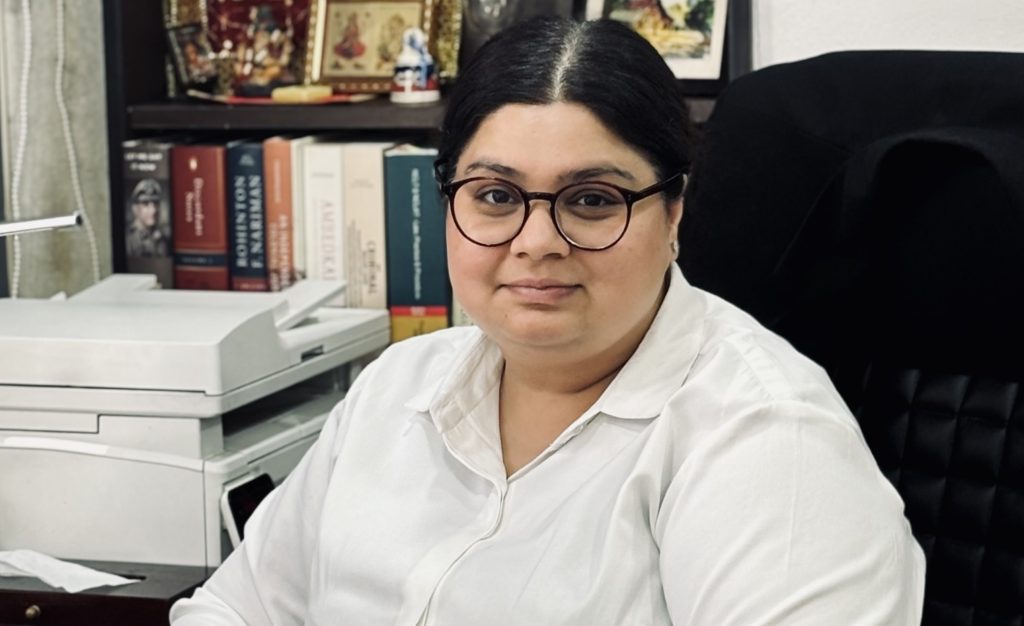This interview has been published by Anshi Mudgal and The SuperLawyer Team
You began your independent practice right after law school, at a time when structured platforms for women litigators, especially in criminal defense, were limited. What inspired you to take that bold step so early in your career?
While studying law I realised that in Mumbai there were few structured opportunities for young women who wanted to build a career in criminal defence. Starting my own practice straight after graduation was a risk, but I wanted to create the kind of ethical and professional environment I had hoped to find. With strong support from my family, particularly my father, I began with pro bono work and built it one brief at a time. Those early choices continue to define our commitment to transparency and high professional standards.
Having completed a decade in the profession, what initially motivated you to pursue law, and how did your experiences in law school deepen your understanding of the subject and shape your decision to take up litigation as a career?
In high school I was active in debate and attended a Youth Conference at the United Nations in New York. Those experiences sparked an interest in advocacy and public affairs. I once considered becoming a commercial pilot but soon realised I wanted a career that allowed me to think critically and work closely with people. By the time I completed my law degree, litigation felt like a natural fit.
Criminal defense, particularly white-collar crimes and complex litigation, is often regarded as one of the most demanding areas of practice. What drew you to this specialization, and how has your experience in this space evolved over time?
Litigation is demanding but deeply rewarding. In criminal defence, defending rights and ensuring due process is both challenging and meaningful. Some of the most intellectually engaging matters have involved clients who cannot pay, where the work is driven entirely by principle. The hours are long and the stakes are high, yet the practice remains fulfilling. Persistence is key to sustaining a career in this field.
You have handled high-profile and complex matters involving banking fraud, narcotics, and serious criminal charges. Could you share an experience that was especially challenging, and how you prepared yourself to handle it effectively?
Early in my career I learned that knowledge of the law is only one part of effective practice. Litigation is about people, strategy and navigating systemic realities. The unpredictable nature of the justice system taught me to create internal processes that bring order to a naturally chaotic environment. We built systems to manage complex briefs while staying client focused and transparent. These lessons continue to guide how our team approaches every case and every client. Because we are active litigators, we bring a trial-tested perspective to all our non-litigation work. Our courtroom experience sharpens the way we draft contracts and structure transactions, and our work in criminal defence makes us particularly attentive to compliance and risk. This combination of skills allows us to offer advice that is both practical and strategically sound.
As the founder and managing partner of Khemka & Associates, your practice has grown far beyond criminal defense into areas like consumer law, insolvency, family law, and cross-border matters. How do you manage these wide-ranging responsibilities while balancing your personal life?
Balancing a litigation practice with personal life is never simple. I have been fortunate to have the support of family and friends from the very beginning. A turning point came when my younger sister, who trained with us while still in law school, formally joined the practice. Her distinct skill set enabled us to expand confidently into areas such as arbitration, consumer law, insolvency and family matters. With a strong team culture and shared values we have been able to grow while staying true to our commitment to professionalism and client service.
You have also dealt with cases involving immigration law and cross-border issues. How have these experiences influenced your practice, and what unique challenges have you faced in handling such matters?
Cross-border matters require working across jurisdictions and cultures. My early international exposure helped me collaborate effectively with foreign lawyers, but the real challenge lies in understanding different legal systems, managing clients across time zones and coordinating procedures. These experiences have strengthened our ability to handle complex briefs and positioned us as a practice that combines local expertise with a global perspective.
Mentorship has been an important part of your journey, particularly in creating opportunities for young women lawyers. What values guide your approach to mentorship, and how do you envision the next generation of litigators evolving in India?
More young women are entering the legal profession, but those who stay the course in litigation, particularly in Mumbai, are still relatively few. Many leave for personal reasons or because of a lack of sustained professional support. At our firm we make mentorship a priority, passing on the values that define our practice: open communication, an insistence that no task is too small or too big, and a belief that consistent effort and hard work are irreplaceable. As technology transforms courts and practice management, it will be inspiring to see how the next generation of litigators shapes this changing landscape.
Having appeared before diverse forums ranging from trial courts to the Supreme Court and specialized tribunals, what key differences have you observed in the way proceedings are conducted in every forum, and how do you adapt your strategies to navigate these differences effectively?
Each forum has its own rhythm and expectations. Trial courts require agility and a deep command of procedure. Higher courts demand precision and a focus on legal principles. Specialised tribunals often call for technical expertise. Every judge manages their docket differently. Success, apart from the merits of the case, depends on quickly understanding these nuances and adapting advocacy accordingly. Clarity, professionalism and thorough preparation remain the constants across every forum.
Finally, after building an independent practice and establishing a recognized firm, what advice would you give to law students and young advocates who aspire to follow a similar path? What has been your source of motivation over the years, and how do you continue to stay inspired for the future of your practice?
Litigation has some significant barriers to entry and starting independently is not easy. Whether you begin on your own or under the guidance of a senior, the training demands focus, resilience and discipline. We are all human and we will make mistakes; the more you practise, the more you learn and the better you become. Patience is key. Over the years I have found motivation in building a practice that combines the rigour of an international firm with a commitment to accessibility. We take on matters across a wide spectrum, sometimes at reduced fees or even pro bono when circumstances require, while maintaining the highest ethical standards. This blend of professionalism and service continues to guide the future of our practice.
Get in touch with Mansha Khemka –




